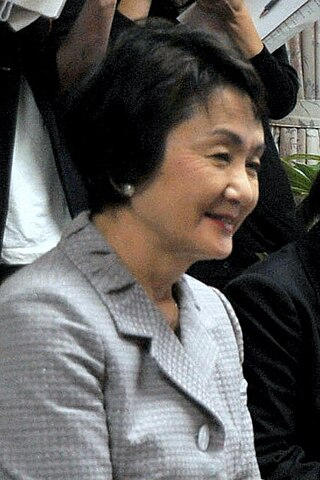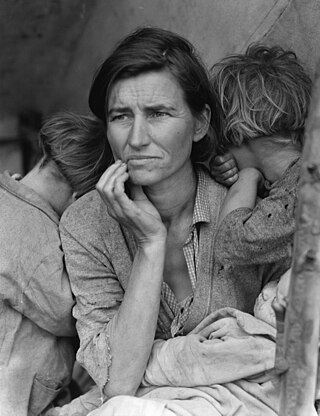
The economy of Zimbabwe relies on the tertiary sector of the economy, also known as the service sector of the economy, which makes up to 60% of total GDP as of 2017. Zimbabwe has the second largest, by percentage, Informal economy in the world, with a score of 60.6%. Agriculture and mining largely contribute to exports. After continuous negative growth between 1999 and 2008, the economy of Zimbabwe grew at an annual rate of 34% from 2008 to 2013, making it the fastest-growing economy in the world. Growth since then has been volatile, but averaged 5% on an end-to-end basis.
In economics, a local currency is a currency that can be spent in a particular geographical locality at participating organisations. A regional currency is a form of local currency encompassing a larger geographical area, while a community currency might be local or be used for exchange within an online community. A local currency acts as a complementary currency to a national currency, rather than replacing it, and aims to encourage spending within a local community, especially with locally owned businesses. Such currencies may not be backed by a national government nor be legal tender. About 300 complementary currencies, including local currencies, are listed in the Complementary Currency Resource Center worldwide database.
A local exchange trading system is a locally initiated, democratically organised, not-for-profit community enterprise that provides a community information service and records transactions of members exchanging goods and services by using locally created currency. LETS allow people to negotiate the value of their own hours or services, and to keep wealth in the locality where it is created.

Subhas Chandra Bose was an Indian nationalist whose defiance of British authority in India made him a hero among many Indians, but his wartime alliances with Nazi Germany and Imperial Japan left a legacy vexed by authoritarianism, anti-Semitism, and military failure. The honorific Netaji was first applied to Bose in Germany in early 1942—by the Indian soldiers of the Indische Legion and by the German and Indian officials in the Special Bureau for India in Berlin. It is now used throughout India.

The 1997 Asian financial crisis was a period of financial crisis that gripped much of East and Southeast Asia during the late 1990s. The crisis began in Thailand in July 1997 before spreading to several other countries with a ripple effect, raising fears of a worldwide economic meltdown due to financial contagion. However, the recovery in 1998–1999 was rapid, and worries of a meltdown quickly subsided.

Comfort women or comfort girls were women and girls forced into sexual slavery by the Imperial Japanese Army in occupied countries and territories before and during World War II. The term "comfort women" is a translation of the Japanese ianfu (慰安婦), which literally means "comforting, consoling woman". During World War II, Japanese troops forced hundreds of thousands of women from Korea, the Philippines, Vietnam, China, and other countries into brothels where they were sexually enslaved and repeatedly raped. Many women died or committed suicide due to brutal mistreatment and sustained physical and emotional distress. After the war, Japan's acknowledgment of the comfort women's plight was minimal, lacking a full apology and appropriate restitution, which damaged Japan's reputation in Asia for decades.
In economics, a time-based currency is an alternative currency or exchange system where the unit of account is the person-hour or some other time unit. Some time-based currencies value everyone's contributions equally: one hour equals one service credit. In these systems, one person volunteers to work for an hour for another person; thus, they are credited with one hour, which they can redeem for an hour of service from another volunteer. Others use time units that might be fractions of an hour. While most time-based exchange systems are service exchanges in that most exchange involves the provision of services that can be measured in a time unit, it is also possible to exchange goods by 'pricing' them in terms of the average national hourly wage rate.

The economic history of Japan is most studied for the spectacular social and economic growth in the 1800s after the Meiji Restoration. It became the first non-Western great power, and expanded steadily until its defeat in the Second World War. When Japan recovered from devastation, it became the world's second largest economy behind the United States, and from 2010 behind China as well. Scholars have evaluated the nation's unique economic position during the Cold War, with exports going to both U.S.- and Soviet-aligned powers, and have taken keen interest in the situation of the post-Cold War period of the Japanese "lost decades".
Dame Billie Antoinette Miller, DA, OOC is a Barbadian politician who served as Deputy Prime Minister. Miller is a member of the Barbados Labour Party (BLP).
A complementary currency is a currency or medium of exchange that is not necessarily a national currency, but that is thought of as supplementing or complementing national currencies. Complementary currencies are usually not legal tender and their use is based on agreement between the parties exchanging the currency. According to Jérôme Blanc of Laboratoire d'Économie de la Firme et des Institutions, complementary currencies aim to protect, stimulate or orientate the economy. They may also be used to advance particular social, environmental, or political goals.

Although women in Japan were recognized as having equal legal rights to men after World War II, economic conditions for women remain unbalanced. Modern policy initiatives to encourage motherhood and workplace participation have had mixed results.

Fumiko Hayashi is a Japanese politician and the former mayor of Yokohama, the capital of Kanagawa Prefecture in Japan. She is the first female mayor of the city. Her previous roles have included president of BMW Tokyo, president of Tokyo Nissan Auto Sales, and chairperson and CEO of the Japanese supermarket chain Daiei. On taking the chief executive role at Daiei, all of whose executives are men, Hayashi told the Nikkei Weekly: "I thought I would be able to create an example of a success in male-female collaboration."

Legend of Dinosaurs & Monster Birds, also known in the U.S. as The "Legend of Dinosaurs", is a 1977 Japanese kaiju science fiction film produced and distributed by Toei Company. The film was initially unsuccessful in Japan, but later became an overseas blockbuster in the Soviet Union.

The Great Depression (1929–1939) was an economic shock that impacted most countries across the world. It was a period of economic depression that became evident after a major fall in stock prices in the United States. The economic contagion began around September 1929 and led to the Wall Street stock market crash of October 24. It was the longest, deepest, and most widespread depression of the 20th century.

Sudha Varghese, also known as Sister Sudha, is a social worker and Catholic nun in India who has devoted herself to the Musahar, the Dalit of Bihar and Uttar Pradesh, one of the Scheduled Castes and who are considered the "untouchables". She resides and works in Jamsaut, a village in Patna district. She is sometimes called didi, which means elder sister.

Women took on many different roles during World War II, including as combatants and workers on the home front. The war involved global conflict on an unprecedented scale; the absolute urgency of mobilizing the entire population made the expansion of the role of women inevitable, although the particular roles varied from country to country. Millions of women of various ages were injured or died as a result of the war.
The Independent Transportation Network of America (ITNAmerica) is a nonprofit transportation network for seniors and people with visual impairments in the United States. It was founded in 2005 by Katherine Freund, the organization's current President.
Lillie Delenzia Cypert served as an American missionary in Japan from October 1917 to December 1943 when she returned to the United States as part of a civilian exchange. Along with Sarah Shepherd Andrews and Hettie Lee Ewing, other single missionaries, she contributed greatly to the setting up of permanent Japanese congregations of the Churches of Christ.

Fallen Blossoms, also titled Flowers Have Fallen and The Blossoms Have Fallen, is a 1938 Japanese drama film directed by Tamizo Ishida, based on a play by Kaoru Morimoto.
Ballad of the Carta.k.a.Song of the Cart is a 1959 Japanese drama film directed by Satsuo Yamamoto. It was written by Yoshikata Yoda, based on a novel by activist Tomoe Yamashiro.












